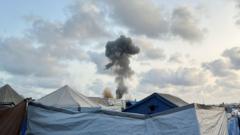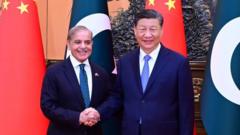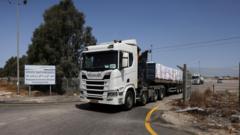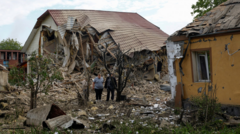Growing discontent among key allies France, the UK, and Canada raises questions about long-standing support for Israel amid escalating humanitarian crises in Gaza.
**Global Allies Express Growing Discontent Over Israel’s Gaza Offensive**

**Global Allies Express Growing Discontent Over Israel’s Gaza Offensive**
International calls intensify for Israel to curtail military action in Gaza as humanitarian concerns take center stage.
Increased military operations and humanitarian failures have strained Israel's relationships with traditional allies, as France, the UK, and Canada have voiced strong opposition to the recent offensive in Gaza. This discontent surfaces after a series of Palestinian casualties, including paramedics, that have shocked the international community.
Israel's military actions followed the October 7 Hamas attacks, which left 1,200 Israelis dead, prompting strong support from the United States and other allies at the onset. However, this solidarity appears to be waning as reports document devastating impacts on the civilian population in Gaza. The three nations released a statement condemning Israeli actions, marking their critique as the strongest yet. They implored Israel to halt military operations, citing unprecedented levels of suffering inflicted on Gazan civilians.
Prime Minister Benjamin Netanyahu's justification for the ongoing military campaign, which aims to dismantle Hamas and rescue hostages, has been met with skepticism. The allies' statement asserts that the military escalation is "wholly disproportionate" to the context of the initial attacks and urges for a ceasefire. As humanitarian concerns escalate, including the warning of an impending famine, pressure mounts on Israel to allow more aid into Gaza, although Netanyahu's recent allowance of limited food supplies has been termed "wholly inadequate."
The rhetoric has intensified, with Netanyahu rejecting the allies' statements as encouragement for further attacks on Israel, while pointing out that the conflict could de-escalate if Hamas adheres to specific demands. This ongoing exchange highlights a critical shift in international attitudes, particularly as reports of civilian harm, deemed unacceptable by European leaders, have begun to frame the narrative of current events in Gaza.
As demonstrations regarding the crisis swell in international cities, the responses from France, the UK, and Canada may signal a broader reevaluation of foreign policy towards Israel. Particularly, suggestions of potential consequences such as sanctions or a recognition of Palestinian statehood have emerged, reflecting a growing impatience with the Israeli government's actions.
The situation remains precarious as Netanyahu faces internal dissent from hardline coalition members opposing any compromise regarding Gaza. Meanwhile, the humanitarian toll continues to rise, compelling global leaders to address the stark realities of the conflict, as seen through the tragic incident involving the deaths of paramedics in March. The increasing criticism from traditional allies could lead to a significant turning point in international relations concerning Israel and its Palestinian policies moving forward.
Israel's military actions followed the October 7 Hamas attacks, which left 1,200 Israelis dead, prompting strong support from the United States and other allies at the onset. However, this solidarity appears to be waning as reports document devastating impacts on the civilian population in Gaza. The three nations released a statement condemning Israeli actions, marking their critique as the strongest yet. They implored Israel to halt military operations, citing unprecedented levels of suffering inflicted on Gazan civilians.
Prime Minister Benjamin Netanyahu's justification for the ongoing military campaign, which aims to dismantle Hamas and rescue hostages, has been met with skepticism. The allies' statement asserts that the military escalation is "wholly disproportionate" to the context of the initial attacks and urges for a ceasefire. As humanitarian concerns escalate, including the warning of an impending famine, pressure mounts on Israel to allow more aid into Gaza, although Netanyahu's recent allowance of limited food supplies has been termed "wholly inadequate."
The rhetoric has intensified, with Netanyahu rejecting the allies' statements as encouragement for further attacks on Israel, while pointing out that the conflict could de-escalate if Hamas adheres to specific demands. This ongoing exchange highlights a critical shift in international attitudes, particularly as reports of civilian harm, deemed unacceptable by European leaders, have begun to frame the narrative of current events in Gaza.
As demonstrations regarding the crisis swell in international cities, the responses from France, the UK, and Canada may signal a broader reevaluation of foreign policy towards Israel. Particularly, suggestions of potential consequences such as sanctions or a recognition of Palestinian statehood have emerged, reflecting a growing impatience with the Israeli government's actions.
The situation remains precarious as Netanyahu faces internal dissent from hardline coalition members opposing any compromise regarding Gaza. Meanwhile, the humanitarian toll continues to rise, compelling global leaders to address the stark realities of the conflict, as seen through the tragic incident involving the deaths of paramedics in March. The increasing criticism from traditional allies could lead to a significant turning point in international relations concerning Israel and its Palestinian policies moving forward.





















